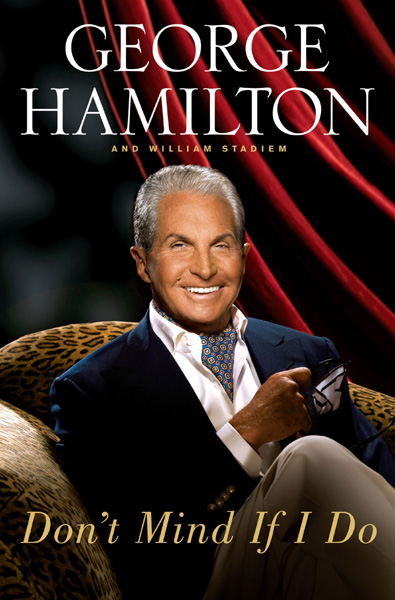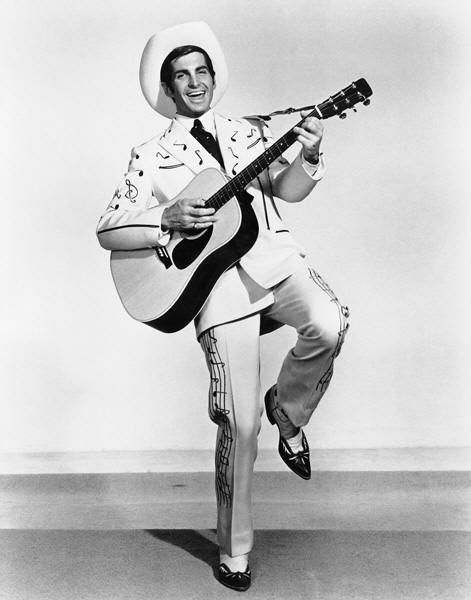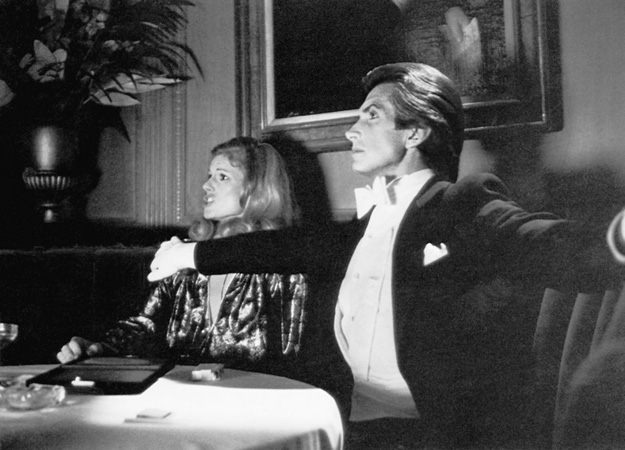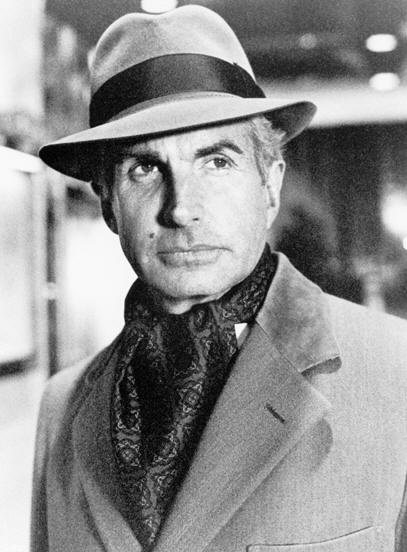Permanently suntanned with a perfect smile and possessing the uncanny
charm and urbane sophistication of a second generation Cary Grant, most
people think they’ve got actor George Hamilton figured out. But there’s
more than meets the eye to the 69-year-old thespian. Carving out over 50
years as an actor, he’s appeared in such acclaimed films as Your
Cheatin’ Heart (a Hank Williams biopic), and Love at First Bite,
Zorro: The Gay Blade, and – dispelling those critics who questioned
his acting skills – delivered a strong performance in The Godfather
III.
His
new book, Don’t Mind If I Do, is an engrossing read that charts
Hamilton’s career path, from early days in Arkansas to a picture perfect
Hollywood life, working with noted directors Louis Malle, Francis Ford
Coppola and Vicente Minnelli, forging friendships with Hollywood royalty
like Elizabeth Taylor, Cary Grant, Sammy Davis Jr., and Elvis Presley to
more recent high profile appearances on Dancing With The Stars.
Reading the acting scouting report on the back of your new book, which
cites "his ability to act is marginal," I'd say you did pretty well in
your career.
That’s not the real scouting report. There was an original report and I
saw it. But that was years ago and I’d have to spend the rest of my life
in storage looking for it. So I reconstructed the report with my brother
for the back cover but it’s the gist of what was said. I remember
reading a similar acting report for Fred Astaire, which said “funny
looking guy with a little bit of an ability to dance.” (laughs) I
thought that was funny and I love to make a joke out of myself. That’s
my sense of humor.
The
truth of the matter is back then, at the start of my career, I probably
couldn’t act. I’d never taken an acting lesson and it was not an era
where if you went under a contract with a studio that you had to be an
actor. They basically bought cattle that were somehow chattel for them
and they trained you. Your whole success was based on tenacity and how
you photographed and then they would teach you some of the tricks of the
trade. I started to develop my own technique. I picked up a lot by
working with some of the greatest actors ever. There were some brilliant
actors I worked with… where by the very nature of being around them
you’d learn something. You’d learn their tricks. You’d learn the way
they moved. Then you’d work with a method actor who really got into a
role and then you’d work with a British actor who came from the stage
whose theory was to just get on with it and that you didn’t have to act.
Then there were actors who had to feel. I think those of us who went
into acting in that era learned by our own devices. You’d get a great
director and you’d feel impotent after you’d worked with him simply
because he brought something out of you but you’d take his expertise
with you. You had to develop your technique. Then you’d work with a
really bad director and say, “I have to save myself form this guy.” Just
by trial and error you’d learn. I’ve been an actor for 50 years and I’ve
been fortunate enough to work with some of the very best actors and I’ve
worked with some really terrible ones. You learn to play tennis with
whomever you worked with in the center ring with the big cats.
 Was
there a moment you realized you’ve truly arrived as an actor in
Hollywood?
Was
there a moment you realized you’ve truly arrived as an actor in
Hollywood?
We
all feel that you’re only as a good as your last job for at least the
first 10, 15, 20 years. Then it becomes 30 years, 35, 40, 45, 50 years
in the business, you think there’s no way to erase your fame. Cary Grant
told me, “If you don’t make a picture every three years you’re no longer
in the business.” I don’t know that I made a picture every three years
but I know that I made an enormous amount of movies. Then came a whole
new era of television with commercials and reality shows and things like
Dancing with the Stars. You think you’re dead and then the
following day 22 million people see you in one evening and that’s more
than ever saw you in your whole career.
Isn’t that ironic?
It’s
ironic and it’s also like being thrown a life preserver. I mean, you get
known for other things altogether. I mean, most of these kids don’t even
know who John Kennedy was. To be remembered for things that might have
not been your best triumphs doesn’t really matter. It doesn’t matter
whether it’s a commercial for a chip or Dancing with the Stars or
whether you were in Godfather III. They just know you. Then comes
that moment where you’re famous for being famous and people stop on the
street and point at you and go, “Oh my God!”
A
lot of my friends first remember you from your 1971 film,
Evel
Knievel.
The
thing about it is at that time Evel was not famous. When we made that
movie he took a jump over the fountains and splattered. He had not
become a Mattel toy at that time. I put a writer on it named John Milius
– who [later] wrote Apocalypse Now. He was the best of the
writers of that era. I got him to write the script for me. Then Milius
made me read the script to Evel. I realized he was kind of a sociopath
and was totally messed. Then all of sudden Evel started to adopt lines
out of the movie for himself. So his persona in the movie became more of
his persona in real life. He would have been every kid’s hero on one
hand, but then he went and took that baseball bat and broke that guy’s
legs and that finished his career in the toy business. Evel was very,
very difficult and he was jealous of anybody that was gonna play him. He
wanted to portray himself and he did go and make his own movie later on.
He had a great perception of this warrior that he thought he was and
that was good. Then he had this other side of himself where he’d turn on
you in a minute. Success is something that you have earn. You have to
have a humility for it, because it can leave you in a second. It may
remember you but it can sure leave you. I think if you don’t get that
and you don’t have gratitude for what you are and where you are it
doesn’t come back and it goes away forever.
 You starred
in the 1964 film, Your
Cheatin' Heart,
about country legend Hank Williams. Wasn’t Elvis Presley’s manager,
Colonel Tom Parker instrumental in getting you the role?
You starred
in the 1964 film, Your
Cheatin' Heart,
about country legend Hank Williams. Wasn’t Elvis Presley’s manager,
Colonel Tom Parker instrumental in getting you the role?
Yes,
The Colonel was absolutely instrumental in helping me get that role. He
told me about the movie and said that his boy, Elvis, was offered the
film. But he had to turn them down because he felt it wouldn’t be good
for Elvis to do a film about another singer. But The Colonel thought
Hank Williams was a very interesting guy. He thought this was a picture
I could do really well. He hadn’t seen the script, Colonel didn’t care
about the script but he did know that the record library was incredible
and that MGM owned it. For a moment, if it was in the hands of a really
fine filmmaker it would have been an Academy Award performance. But it
went to Sam Katzman who, God rest his soul, was the “King of Schlock.”
He told me that we had thirteen days to shoot the movie with eleven
songs. No matter where we were they were pulling the plug on the
thirteenth day. Not many pictures have ever been made in that time. But
what happened that preceded it is Colonel told me to “go down to
Nashville and fight for it.” He talked to Audrey Williams, Hank’s
window. So I went down there and hung out with Audrey (Williams) and
listened to all the stories. I went to honky tonks and met his father.
When I came back they offered me more for that picture than they had for
two years of being under contract. They had to have me because Audrey
Williams said, “There’s nobody else that can play him.” As an actor I
got a bead on him. I understood the guy before I walked on that stage.
So I said to the director, “I’ve got this one in hand. Just get the
camera close in on me and change these songs around because these songs
are in the wrong order. Let’s have these eleven songs mean something
about him.” And that’s what Gene Nelson did. He was very good about
that. On the thirteenth day, I finished my death scene and I felt I’d
given one of my best performances. I slept an hour a night and I still
love that film. It was Hank Williams as far as I was concerned.
Among your work,
Love at First Bite
remains a favorite.
My
career had died and I was looking for something I could do. I was
sitting with a crazy comedian and writer named Bob Kaufman I’d worked
with on a terrible movie, The Happy Hooker Goes to Washington. I
was out by the pool and we were having a few drinks and we started
pitching around ideas for a movie. The ideas he was pitching were just
awful. One was “How the West Was Shrunk,” which was about the first
Freudian trained analyst out West. I said, “I don’t think so.” Another
was “Debbie Dybbuk,” Mel Brooks’ voice in a little girl. It was just one
thing after the other. And then he said, “Dracula Sucks.” I said,
“Dracula Sucks? That’s a funny idea but I don’t like the title.” At that
time you couldn’t use titles like that. Then I said, “What if Dracula
was somewhere like New York and he was the victim?” Then I started doing
lines that Lenny Bruce would do and we started laughing. He said
“Dracula living in New York and being a victim is a funny idea.” So we
started writing the script and changed the title to Love at First
Bite.
 I
didn’t have any backers so I sold “How the West Was Shrunk” to Mel
Simon, a guy who owned shopping centers out in Detroit and then at the
last minute said, “You know something, you’re missing something even
better.” I told him about “Dracula Sucks” and the guy put up the money
for the movie. I paid Bob Kaufman to write it, produced the movie, and
acted in it. People said it would be the picture that would put the nail
in my coffin and it wasn’t. It was a big success and was the one that
freed me up.
I
didn’t have any backers so I sold “How the West Was Shrunk” to Mel
Simon, a guy who owned shopping centers out in Detroit and then at the
last minute said, “You know something, you’re missing something even
better.” I told him about “Dracula Sucks” and the guy put up the money
for the movie. I paid Bob Kaufman to write it, produced the movie, and
acted in it. People said it would be the picture that would put the nail
in my coffin and it wasn’t. It was a big success and was the one that
freed me up.
Before
Godfather III came along, did you think it was unlikely you’d ever
get a meaty role that would show off your acting chops?
To
be honest, I don’t think about having talent or the need to show it off.
I was having a drink in the Polo Lounge and I got a call that said
Francis Coppola wanted me to come to Rome immediately to Italy for
The Godfather and I thought (laughs) “That’s Bob Evans
again.” I said, “Tell him I know it’s a prank and to stop it.” Four days
later I get a call from the producer on The Godfather, a guy that
I did know named Gray Frederickson. He said, “Why won’t you take
Francis’s call?” And I said, “What?” And he said, “Francis Coppola has
been trying to reach you and you won’t take his call.” And I said,
“Because it’s not true, it’s an elaborate prank, don’t you see?” Finally
I got a call from a very important guy that I knew who told me, “George,
you’ve got to do something because this is a real deal!” I said, “You’ve
got to be kidding!” I got on a plane went to Rome, met with Francis and
the first thing he said to me was,
 “What
kind of luggage should I get?” And I said, “I beg your pardon?” He said,
“I’m gonna go back to Sicily and I have to try and figure out what kind
of luggage to get.” I said to myself, now this is a joke. This is a big
joke and they’ve pulled it off on me. Then he said, “I don’t know what
I’m gonna do with you but I want you in this movie.” He sent me to
wardrobe and to makeup and they messed with my hair and they bleached it
totally white. Then the next thing I had to do was do a screen test
testing another actor,
not
me and I was playing Al Pacino. I said, “What is this? This is the
sickest joke I’ve ever heard.” Finally, Francis said, “You’re gonna play
the equivalent of the consigliore in a modern day lawyer field. You’re
the lawyer that goes between the Vatican bank and the Corleone family
and Wall Street. It had a lot of Freemason stuff going on. I started to
realize it was very dark and hidden away. It was a forerunner of all the
Freemason stuff that came out later. On my first day I worked in front
of 500 extras. I was the first one to work. I was explaining a deal to
stock holders. I worked on the very first day to the very last day on
that movie. I just stood behind Al (Pacino) and counted his hair.
(laughs) I just looked interested all the time and wherever he went
I was to shadow him. Al and I became the best of friends and still are.
I was all over the movie and people were saying I might get a
nomination. Then I went to see the premiere of the film and I started
disappearing and I was very disappointed. I found out that they put back
in all the Diane Keaton stuff because they were worried about all the
Vatican Freemasonry stuff. They’d been warned that it was pretty heavy
duty stuff. It was like The Da Vinci Code way before its
time. Then when I saw the trilogy and they started putting back all that
stuff.
“What
kind of luggage should I get?” And I said, “I beg your pardon?” He said,
“I’m gonna go back to Sicily and I have to try and figure out what kind
of luggage to get.” I said to myself, now this is a joke. This is a big
joke and they’ve pulled it off on me. Then he said, “I don’t know what
I’m gonna do with you but I want you in this movie.” He sent me to
wardrobe and to makeup and they messed with my hair and they bleached it
totally white. Then the next thing I had to do was do a screen test
testing another actor,
not
me and I was playing Al Pacino. I said, “What is this? This is the
sickest joke I’ve ever heard.” Finally, Francis said, “You’re gonna play
the equivalent of the consigliore in a modern day lawyer field. You’re
the lawyer that goes between the Vatican bank and the Corleone family
and Wall Street. It had a lot of Freemason stuff going on. I started to
realize it was very dark and hidden away. It was a forerunner of all the
Freemason stuff that came out later. On my first day I worked in front
of 500 extras. I was the first one to work. I was explaining a deal to
stock holders. I worked on the very first day to the very last day on
that movie. I just stood behind Al (Pacino) and counted his hair.
(laughs) I just looked interested all the time and wherever he went
I was to shadow him. Al and I became the best of friends and still are.
I was all over the movie and people were saying I might get a
nomination. Then I went to see the premiere of the film and I started
disappearing and I was very disappointed. I found out that they put back
in all the Diane Keaton stuff because they were worried about all the
Vatican Freemasonry stuff. They’d been warned that it was pretty heavy
duty stuff. It was like The Da Vinci Code way before its
time. Then when I saw the trilogy and they started putting back all that
stuff.
Had
it not been attached to the
Godfather name, the film would have been better received.
I
was there the day Winona Ryder came in and she was supposed to do it
after Madonna fell out. I think Francis really did want his daughter
Sofia in it. I think she’s very talented and very smart, a good producer
and director. But I didn’t think she should do that role. When they put
her in it, it changed the whole context of the film. Winona was very
tired. Johnny Depp was with her and I was in the makeup room and she put
her head down for a few minutes and that was Francis’ chance to say
adios and he brought in his daughter.
Looking back at your life, if you could whisper one piece of advice in
the ear of a young George Hamilton, what would you say and why?
I
think that what I said earlier is really the real thing because I’ve got
a young George Hamilton, who’s my son, Ashley. We just finished doing
The View together. He did a comedy segment on the show that was
great. We were walking down the street afterwards and there were agents
calling him on the phone. I said, “It’s amazing. Here we are an hour
after The View and look at all the people stopping on the street
and pointing at you. All of sudden you’re on the map but don’t ever
forget what was preceding that moment. Be grateful for what it is. It’ll
always come to you as long as you’re grateful. But if you start to get a
big head about this it goes away. I should know. I’ve been doing this
for 50 years.” And he said, “Yeah, you know you’re right dad.” We walked
arm in arm down Madison Avenue and it was like I’d gone back 50 years.
It was the best. It was like me being with me all of a sudden.
(laughs)
Features Return to the features page